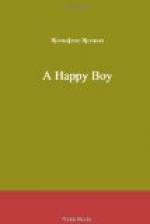And the wooing proceeded as shall now be told.
The school-master: “We are having fine weather this autumn, after all.”
Thore: “It has been mending of late.”
“It is likely to remain pleasant, now that the wind is over in that quarter.”
“Are you through with your harvesting up yonder?”
“Not yet; Ole Nordistuen here, whom, perhaps, you know, would like very much to have help from you, Oyvind, if there is nothing else in the way.”
Oyvind: “If help is desired, I shall do what I can.”
“Well, there is no great hurry. The gard is not doing well, he thinks, and he believes what is wanting is the right kind of tillage and superintendence.”
Oyvind: “I am so little at home.”
The school-master looks at Ole. The latter feels that he must now rush into the fire; he clears his throat a couple of times, and begins hastily and shortly,—
“It was—it is—yes. What I meant was that you should be in a certain way established—that you should—yes—be the same as at home up yonder with us,—be there, when you were not away.”
“Many thanks for the offer, but I should rather remain where I now live.”
Ole looks at the school-master, who says,—
“Ole’s brain seems to be in a whirl to-day. The fact is he has been here once before, and the recollection of that makes his words get all confused.”
Ole, quickly: “That is it, yes; I ran a madman’s race. I strove against the girl until the tree split. But let by-gones be by-gones; the wind, not the snow, beats down the grain; the rain-brook does not tear up large stones; snow does not lie long on the ground in May; it is not the thunder that kills people.”
They all four laugh; the school-master says:
“Ole means that he does not want you to remember that time any longer; nor you, either, Thore.”
Ole looks at them, uncertain whether he dare begin again.
Then Thore says,—
“The briar takes hold with many teeth, but causes no wound. In me there are certainly no thorns left.”
Ole: “I did not know the boy then. Now I see that what he sows thrives; the harvest answers to the promise of the spring; there is money in his finger-tips, and I should like to get hold of him.”
Oyvind looks at the father, he at the mother, she from them to the school-master, and then all three at the latter.
“Ole thinks that he has a large gard”—
Ole breaks in: “A large gard, but badly managed. I can do no more. I am old, and my legs refuse to run the errands of my head. But it will pay to take hold up yonder.”
“The largest gard in the parish, and that by a great deal,” interrupts the school-master.
“The largest gard in the parish; that is just the misfortune; shoes that are too large fall off; it is a fine thing to have a good gun, but one should be able to lift it.” Then turning quickly towards Oyvind, “Would you be willing to lend a hand to it?”




